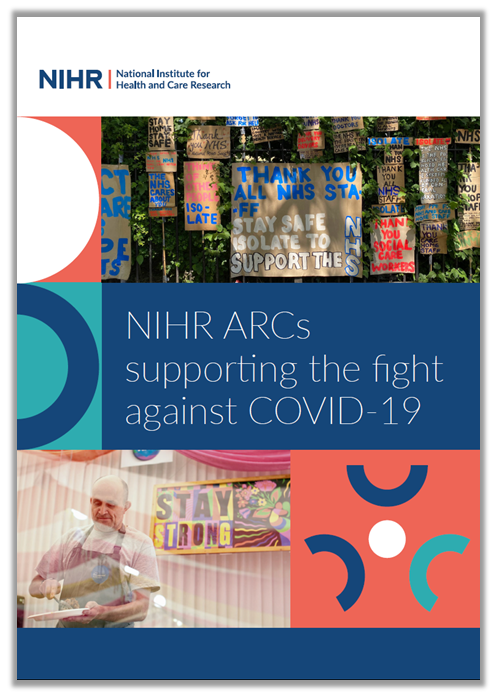A national publication highlighting how the National Institute for Health and Care Research Applied Research Collaborations (NIHR ARCs) rose to the challenge of COVID-19 launches today, the third anniversary of the first UK lockdown.
Vital work from across the ARCs in response to the pandemic is showcased in NIHR ARCs: Supporting the fight against COVID-19 (PDF), including three PenARC projects.
The publication brings together case studies demonstrating how ARCs pivoted their research programmes in response to the pandemic. It showcases work across a range of themes including children and young people, care homes, equality and diversity, end-of-life care and workforce planning.
South West highlights
- Emergency Care: Using an interactive tool to provide vital support to emergency services. Researchers and healthcare professionals combined their expertise to develop an interactive tool for healthcare trusts to ensure they maintained sufficient levels of life-saving equipment and bed spaces during the pandemic.
- Dementia: Providing evidence-based guidance on how those living with dementia can stay well during the pandemic. The IDEAL Project focused on people with dementia, who are particularly vulnerable to the psychological and social impacts of isolation and lockdown. This resulted in multiple outputs, including The Living with Dementia toolkit, originally envisaged as a source of support during the pandemic, which evolved into a long-lasting resource to provide hope and inspiration for people living with dementia and their families.
- Collaborating: Building a national collaboration for Operational Research (OR). Coordinating online collaborations across the UK, focusing on the use of OR to address key issues in the pandemic, including modelling demand and predicting ongoing workforce and bed capacity. The collaboration has since been rebranded as HaCORN (Health and Care Operational Research Network), extending this collaborative working to all areas of health and social care.
Professor Stuart Logan, Director of PenARC said:
“I was absolutely amazed and inspired by the way in which our PenARC colleagues adapted and responded to the challenges posed by COVID-19, both professionally and personally. The examples above are just a sample of the service-changing and life-saving work produced at pace by our teams and collaborators. This report provides a wonderful opportunity to reflect on how far we’ve come over the past three years, celebrate these successes and continue to build upon them.”
Sharing successes
Professor Lucy Chappell, Chief Executive of the NIHR and the Department of Health and Social Care’s Chief Scientific Advisor, said:
“The COVID-19 pandemic was unlike any health crisis we had experienced for a century. In order for us to tackle the pandemic swiftly and strongly, we needed a collaborative and sustained approach across health and care research that harnessed the power of our collective effort like never before.
“This impressive report sets out how that effort was provided, extending across many different themes, specialisms, and areas of the country. It illustrates how researchers, working together to tackle a common cause, can have such an important impact for patients and the public.”
In the foreword, the ARC Directors write:
“In 2020, we made rapid changes to our research programmes across the ARCs, to inform policy and practice, improve health and care, and deliver national-level impact in this rapidly changing landscape.
“Our expertise in data modelling, multiple long-term conditions, mental health and social care alongside our ability to build and sustain collaborations across the NHS, social care, the voluntary sector and industry, has placed us in a unique position. We have been able to contribute to the efforts to understand the virus and its impact on communities, locally, nationally and globally.
“This publication outlines our response as ARCs, both collectively and individually, to this challenge. It showcases the part we have played in supporting the health and care sector and patients, public and communities. We are proud of our part in lending our expertise to understanding the disease and assisting the global effort to contain it, improving outcomes and saving lives.”
Download NIHR ARCs: Supporting the fight against COVID-19 (PDF).
This publication was led by NIHR ARC East Midlands, with communications support from NIHR ARC West.

